
by Jason Joyner | Jun 9, 2009 | Blog, books, CFBA, fiction, reviews
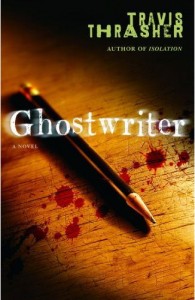 The latest book for the CFBA Tour is Ghostwriter by Travis Thrasher.
The latest book for the CFBA Tour is Ghostwriter by Travis Thrasher.
Dennis Shore is the latest, greatest horror writer. His books have sold millions, but since his wife’s death he has been unable to write at all. Desperate to keep up with medical bills, he sends in a manuscript from an undiscovered writer, Cillian Reed, and it becomes his latest smash novel, with critical acclaim. He is already haunted by the guilt of his crime, but the true author begins harrassing Dennis. First with words, then with demonstrations, Dennis becomes caught up in his own horror story. Will he find the way out, or will he become like too many of his characters before him?
There’s been a few books I’ve read on the topic of a horror writer unable to write anymore. From the contemplative (Dave Long’s Ezekiel’s Shadow) to the humerous (Rene Gutteridge’s hilarious Boo series), it seems like a rich theme to mine. Ghostwriter aims for the straightforward suspense/horror aspect.
I had a hard time with this book on several levels. The main character Dennis Shore is not someone I wanted to root for. He stole the manuscript, so he brought things on himself to a degree. There was some mild sympathy in the loss of his beloved wife, but they didn’t tug the heart strings. The antagonist Cillian Reed and his friend Bob were similarly thin, without much to recommend them as fully developed characters.
Suspense is built up at times, but it starts slowly and builds in a disjointed fashion, as Dennis wrestles with his wife’s death. There is a point to this, but in my opinion it distracted from the flow more than it provided emotional punch.
There is a major twist that is handled very well-it surprised me and renewed my interest in the book for a while. It ended up being too little too late. The ending turns quickly and felt pretty contrived to me. Too convenient to bring around a happier ending.
If readers have an aversion to violent imagery, there is some in this book. It seems appropriate for a mild horror novel, and it is not excessive by my reckoning, but sensitive people should be aware.
Overall, I was fairly disappointed and struggled to finish the book. Ghostwriter has an intriguing premise and some moments that work, but overall there weren’t many goose bumps on my arms by the time I hit “The End”.
If you would like to read the first chapter of Ghostwriter, go HERE.
—
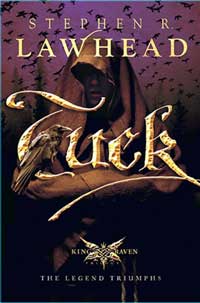
by Jason Joyner | May 20, 2009 | Blog, reviews, speculative fiction, Stephen Lawhead, Tuck
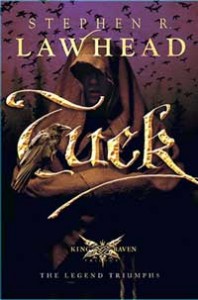
After limping through this tour by pulling up old content of mine, I finally have something original to offer: my review of Stephen Lawhead’s latest book, Tuck.
*The final book of the King Raven trilogy picks the action up right after the ending betrayal in Scarlet. Bran and his followers, the Grellon, are returning to the wild and dark forest known as the Marsh when Norman knights ride up on them for an ambush.
After the battle, Bran attempts a peace accord with the usurping lord of his kingdom, Abbot Hugo and his marshal Guy Gysburne. The overture is grossly spurned, and Bran is determined to fight for their rightful freedom. He travels to the northern Welsh to enlist his mother’s kin to help him, while Lady Merian considers the help her own family might be able to offer.
As Bran attempts a daring rescue for a northen Welsh king, his foes bring in the armies of King William Rufus. A climatic battle looms for the woodland fugitives, whether the help is available or not…*
Tuck brings out all the things we love about the Robin Hood legend – arrows flying, daring escapes, cunning impersonations, and a friar who raps the bad guys on the head with a stout staff.
I’ve noted in my last two posts on the first books, Hood and Scarlet, that Lawhead is a great writer but somewhat streaky. Tuck falls into the pattern of the first book, with multiple third person points of view, although mainly following the jolly fat friar we all know and love. Scarlet was mainly from Will Scarlet’s point of view, differing from the other books. Changing point of view is a Lawhead trademark, and I think this sometimes is his undoing.
Thankfully, he avoids the letdown trap in Tuck. Lawhead really found an authentic voice and characterization for all of his major characters. Bran (Robin Hood), Tuck, King William, and others have distinct personalities and act believably throughout. The forest is a tangible danger for the Ffreinc knights who try to defeat the Grellon, but the overwhelming numbers provide equally real suspense whether Bran will succeed or not.
There is a good balance of action and rest in between conflict, without any real dragging parts. As the third in the series, there is a pretty good introduction to all the characters without slowing down the plot. I read the first two long enough ago I couldn’t remember all the events that are mentioned, so that was my only complaint in this area.
Overall Tuck is a highly enjoyable and satisfying finish to a very strong series. I think Scarlet was the best book of the series, but Lawhead did a very good job of making each book stand up on its own.
If you’re a fan of historical fiction, alternate stories, or speculative fiction, then this series is for you. There is enough Celtic lore to make it speculative, even though it mostly rests in the historical realm. However, any fan of Christian speculative fiction would do well to read liberally from Lawhead’s collection of books.
—

by Jason Joyner | May 20, 2009 | Blog, reviews, speculative fiction, Stephen Lawhead, Tuck

After limping through this tour by pulling up old content of mine, I finally have something original to offer: my review of Stephen Lawhead’s latest book, Tuck.
*The final book of the King Raven trilogy picks the action up right after the ending betrayal in Scarlet. Bran and his followers, the Grellon, are returning to the wild and dark forest known as the Marsh when Norman knights ride up on them for an ambush.
After the battle, Bran attempts a peace accord with the usurping lord of his kingdom, Abbot Hugo and his marshal Guy Gysburne. The overture is grossly spurned, and Bran is determined to fight for their rightful freedom. He travels to the northern Welsh to enlist his mother’s kin to help him, while Lady Merian considers the help her own family might be able to offer.
As Bran attempts a daring rescue for a northen Welsh king, his foes bring in the armies of King William Rufus. A climatic battle looms for the woodland fugitives, whether the help is available or not…*
Tuck brings out all the things we love about the Robin Hood legend – arrows flying, daring escapes, cunning impersonations, and a friar who raps the bad guys on the head with a stout staff.
I’ve noted in my last two posts on the first books, Hood and Scarlet, that Lawhead is a great writer but somewhat streaky. Tuck falls into the pattern of the first book, with multiple third person points of view, although mainly following the jolly fat friar we all know and love. Scarlet was mainly from Will Scarlet’s point of view, differing from the other books. Changing point of view is a Lawhead trademark, and I think this sometimes is his undoing.
Thankfully, he avoids the letdown trap in Tuck. Lawhead really found an authentic voice and characterization for all of his major characters. Bran (Robin Hood), Tuck, King William, and others have distinct personalities and act believably throughout. The forest is a tangible danger for the Ffreinc knights who try to defeat the Grellon, but the overwhelming numbers provide equally real suspense whether Bran will succeed or not.
There is a good balance of action and rest in between conflict, without any real dragging parts. As the third in the series, there is a pretty good introduction to all the characters without slowing down the plot. I read the first two long enough ago I couldn’t remember all the events that are mentioned, so that was my only complaint in this area.
Overall Tuck is a highly enjoyable and satisfying finish to a very strong series. I think Scarlet was the best book of the series, but Lawhead did a very good job of making each book stand up on its own.
If you’re a fan of historical fiction, alternate stories, or speculative fiction, then this series is for you. There is enough Celtic lore to make it speculative, even though it mostly rests in the historical realm. However, any fan of Christian speculative fiction would do well to read liberally from Lawhead’s collection of books.
—
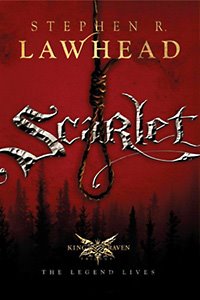
by Jason Joyner | May 19, 2009 | Blog, CSFF, reviews, Scarlet, Stephen Lawhead, Tuck

I’m honoring our CSFF tour featuring the re-imagining of the Robin Hood legend by popular fantasy and historical author Stephen Lawhead.
How?
I’m stealing from my past. Leading up to a review of the latest book of the King Raven trilogy, Tuck, I present my past review of the second book of the series, Scarlet. Back when I remembered what happened!
From November ’07:
Yesterday for the CSFF tour I posted my review of the first book of the Raven King Trilogy, Hood. In it I mentioned that, while I have enjoyed many of Stephen Lawhead’s books, I have found him to be a streaky writer. In the Song of Albion series, the first two books were great, while the third one got a little tedious. I enjoyed The Iron Lance of the Celtic Crusades series, but bogged down in The Black Rood. Same with the Pendragon Cycle: loved the first book, lost interest in the second. Does the sophomore curse affect the second book of his new series, Scarlet?
I can answer a resounding NO.
Scarlet is a better book than its predecessor. Not that Hood wasn’t very enjoyable, but Scarlet improves some pacing issues and kept me intrigued more. It is the story of Will Scarlet, here a Saxon forester who is displaced from his lands and decides to seek out the infamous King Raven, who is tormenting the Normans (Ffreinc) who have invaded the lands of the Welsh. After joining Rhi Bran y Hud, Scarlet’s skill allows him to become a trusted member of Bran’s inner circle. As the fugitives work toward eventual freedom for their kingdom, Will becomes captured and is set for the noose (hence the cover of the book).
The book has an interesting structure. It is mainly from Will Scarlet’s point of view, first person, as he is in prison awaiting his hanging. He is telling his story to a priest who is acting as a scribe. It is a unique way to tell a story such as this, and it surprisingly works very well. There are some asides from Will to the poor Norman priest throughout, but instead of being distracting, it adds to the understanding of who Will is. The book occasionally shifts to third person when it moves into another character’s point of view.
Lawhead’s ability to weave an enchanting story from history and legend is unparalleled. His research and knowledge base is always top-notch, it is only a matter if he’s created a strong plot to go along with it. This time around he keeps the action near and the suspense palpable. The back and forth between Rhi Bran and the invaders is never fully decided throughout the book. There is also a nice tension with the politics running through the book that leaves us with an imposing cliffhanger that won’t be resolved until the third book, Tuck, comes out (which sadly won’t be for a while due to the author’s recent illness).
The storytelling sequence by Angharad is interesting yet the slowest part of the tale, much like in Hood. Occasionally the POV changes among different antagonists is confusing. However, this is a book with great setting, characters, and plot. I highly recommend the series so far, as it is a very good introduction to Stephen Lawhead.
See Becky Miller’s blog for the latest updates with other tour members, and perhaps I’ll have something original tomorrow!

by Jason Joyner | May 19, 2009 | Blog, CSFF, reviews, Scarlet, Stephen Lawhead, Tuck

I’m honoring our CSFF tour featuring the re-imagining of the Robin Hood legend by popular fantasy and historical author Stephen Lawhead.
How?
I’m stealing from my past. Leading up to a review of the latest book of the King Raven trilogy, Tuck, I present my past review of the second book of the series, Scarlet. Back when I remembered what happened!
From November ’07:
Yesterday for the CSFF tour I posted my review of the first book of the Raven King Trilogy, Hood. In it I mentioned that, while I have enjoyed many of Stephen Lawhead’s books, I have found him to be a streaky writer. In the Song of Albion series, the first two books were great, while the third one got a little tedious. I enjoyed The Iron Lance of the Celtic Crusades series, but bogged down in The Black Rood. Same with the Pendragon Cycle: loved the first book, lost interest in the second. Does the sophomore curse affect the second book of his new series, Scarlet?
I can answer a resounding NO.
Scarlet is a better book than its predecessor. Not that Hood wasn’t very enjoyable, but Scarlet improves some pacing issues and kept me intrigued more. It is the story of Will Scarlet, here a Saxon forester who is displaced from his lands and decides to seek out the infamous King Raven, who is tormenting the Normans (Ffreinc) who have invaded the lands of the Welsh. After joining Rhi Bran y Hud, Scarlet’s skill allows him to become a trusted member of Bran’s inner circle. As the fugitives work toward eventual freedom for their kingdom, Will becomes captured and is set for the noose (hence the cover of the book).
The book has an interesting structure. It is mainly from Will Scarlet’s point of view, first person, as he is in prison awaiting his hanging. He is telling his story to a priest who is acting as a scribe. It is a unique way to tell a story such as this, and it surprisingly works very well. There are some asides from Will to the poor Norman priest throughout, but instead of being distracting, it adds to the understanding of who Will is. The book occasionally shifts to third person when it moves into another character’s point of view.
Lawhead’s ability to weave an enchanting story from history and legend is unparalleled. His research and knowledge base is always top-notch, it is only a matter if he’s created a strong plot to go along with it. This time around he keeps the action near and the suspense palpable. The back and forth between Rhi Bran and the invaders is never fully decided throughout the book. There is also a nice tension with the politics running through the book that leaves us with an imposing cliffhanger that won’t be resolved until the third book, Tuck, comes out (which sadly won’t be for a while due to the author’s recent illness).
The storytelling sequence by Angharad is interesting yet the slowest part of the tale, much like in Hood. Occasionally the POV changes among different antagonists is confusing. However, this is a book with great setting, characters, and plot. I highly recommend the series so far, as it is a very good introduction to Stephen Lawhead.
See Becky Miller’s blog for the latest updates with other tour members, and perhaps I’ll have something original tomorrow!
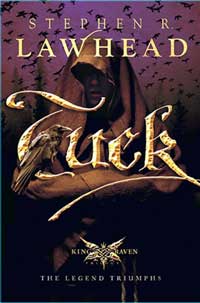
by Jason Joyner | May 18, 2009 | Blog, CSFF, fantasy, Hood, reviews, Stephen Lawhead, Tuck
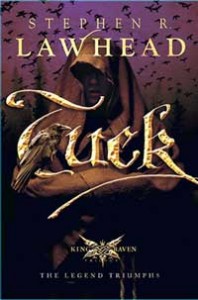 What, me worried?
What, me worried?
Time again for the Christian Sci-fi and Fantasy blog tour. The featured book this month is
Tuck, the latest book from
Stephen Lawhead and the finale of the King Raven Trilogy.
Who is King Raven?
None other than the legend Robin Hood, reimagined by Lawhead as a Welsh prince called Rhi Bran y Hud, trying to repel Norman invaders from his homeland, with a little help from some familiar characters. If this seems a little controversial, see
this article from a London news site.
The worried part is that this blog tour is coming at a bad time for me, as we are moving into our new house this weekend. I wondered what I could contribute in limited time, but thank goodness for preparedness, as I had written reviews of the previous two books in the series (it’s not plagerism if I’m copying myself). So, to quote myself, here’s my review of the first book in the series, Hood.
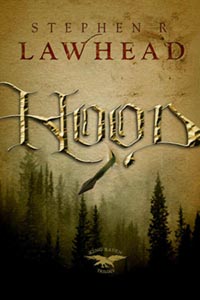
From December ’06:
Most of the books I review are through the two blogging groups I belong to. I keep busy enough with those books, but I do venture out to the library for other stories. One I read this fall that I enjoyed very much was Hood, by
Stephen Lawhead.
He seems to be a streaky writer. He’ll have a very strong story followed by one that loses my interest quickly. I was very interested in his new
King Raven trilogy, but would it catch my attention and hold it?
Thankfully, yes.
Hood is a re-imaging of the Robin Hood legend. And not of the Kevin Costner variety. I am sure there are many aficionados on this subject out there who might begin to argue with Lawhead’s premise, but I think he will quickly short-circuit any criticism. He sets the story in Wales instead of England, during the time when the French (Ffreinc) control England and are encroaching into Welsh territory. As a point of interest, he gives an appendix that discusses his research and choice of scenery.
Bran ap Brychan is a spoiled lout of a prince when his harsh father is cut down by the troops of a Norman count. As a fugitive he is almost killed, but is saved by a withered old woman whose mysteries both repulse and intrigue the young lord. As he is nursed to health, he catches a vision of what he could become.
Meanwhile, political intrigue is stirring in the land, which may include a young woman named Merian. Will Rhi Bran follow his destiny and free his lands and people from their cruel masters? How will he overcome the invading forces of the Ffreinc?
The book will appeal to fans of historical fiction, action tales, and fantasy alike. Lawhead has a gift for tales of British folklore, and Hood is the perfect subject for him to tackle. He catches your attention quickly with tragedy and discovery. You will come across familiar faces set in new ways – and in this prepare to be enchanted! He does a fun turn with some of the famous Robin Hood supporting cast.
The turning of Bran’s character is thoughtful and inspiring. The wickedness he is up against is a good foil – you’re ready to root against the enemy. But you don’t always know who the enemy is either. The book does slow a little in the middle, but it does not disappoint. The ending leaves you hanging and anxious for book 2 (Scarlet).
—

 The latest book for the CFBA Tour is Ghostwriter by Travis Thrasher.
The latest book for the CFBA Tour is Ghostwriter by Travis Thrasher.




